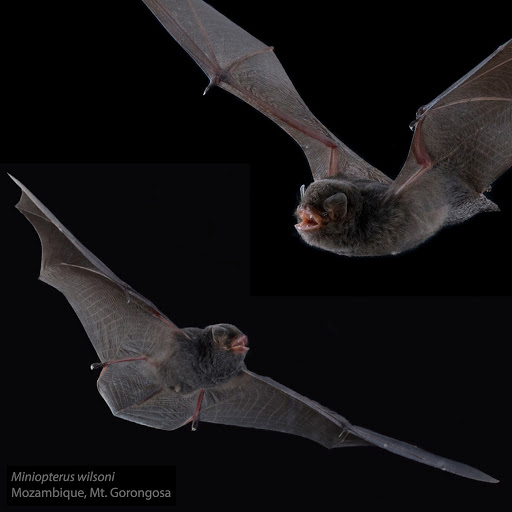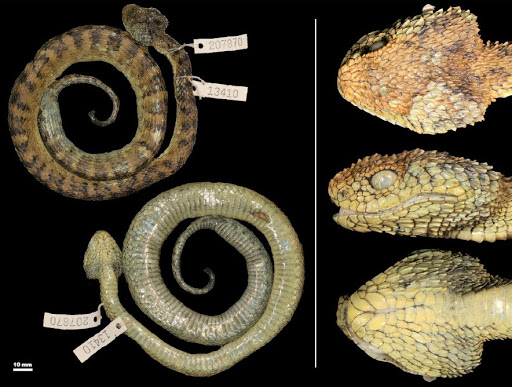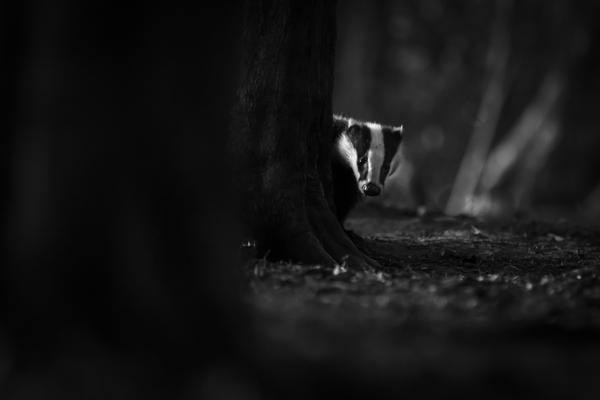Despite expanding fires, Brazil suspends operations to combat Amazon deforestation
Monday 31 August 2020
Brazil suspends operations to combat Amazon deforestation
Is an African wild dog actually a dog?
Is an African wild dog actually a dog? Candid Animal Cam meets the rare canid
MONGABAY: A mysterious heart bone in chimps points to cardiac disease
A mysterious heart bone in chimps points to cardiac disease
NOVATAXA: [Herpetology • 2020] Cnemaspis rishivalleyensis & Hemidactylus rishivalleyensis • Geckos in the Granite: Two New Geckos (Squamata: Gekkonidae) from Rocky, Scrub Habitats in Rishi Valley, Andhra Pradesh, India
[Herpetology • 2020] Cnemaspis rishivalleyensis & Hemidactylus rishivalleyensis • Geckos in the Granite: Two New Geckos (Squamata: Gekkonidae) from Rocky, Scrub Habitats in Rishi Valley, Andhra Pradesh, India
 |
| Cnemaspis rishivalleyensis & Hemidactylus rishivalleyensis Agarwal, Thackeray & Khandekar, 2020. |
NOVATAXA: The Bush Vipers, Genus Atheris Cope, 1862(Squamata: Viperidae) of Bioko Island, Gulf of Guinea, with the Description of A New Species
[Herpetology • 2020] Atheris hetfieldi • The Bush Vipers, Genus Atheris Cope, 1862(Squamata: Viperidae) of Bioko Island, Gulf of Guinea, with the Description of A New Species
 |
| Atheris hetfieldi Ceríaco, Marques & Bauer, 2020 Hetfield’s Bush Viper || DOI: 10.11646/zootaxa.4838.4.9 Illustration by Arthur C. Wandeur |
Abstract
Two species of Bush Vipers, genus Atheris Cope, 1862, have been reported for the continental island of Bioko, Gulf of Guinea – Atheris squamigera and a putatively undescribed species, morphologically similar to Atheris chlorechis. The latter was only known from one specimen collected in the early 1900s and its taxonomic identity has never been fully resolved. Based on recently collected specimens of Atheris from Bioko Island, we reviewed all the available data and specimens through detailed morphological comparisons against all known species of the genus. Our results confirm that Atheris squamigera is present in Bioko Island, and that the second taxon is a new species, which we describe here as Atheris hetfieldi sp. nov. The newly described species presents a series of morphological characters that clearly differentiate it from all of its congeners. The description of this new species is the first of a new snake species from Bioko in more than 100 years and this species is the only snake currently recognized as endemic to the island.
[Crustacea • 2020] Zoukaris festivus • A New Deep-water Palaemonid Shrimp Genus and Species (Decapoda: Caridea) from the French Antilles, with A New Record ofPericlimenes milleri Bruce, 1986
[Crustacea • 2020] Zoukaris festivus • A New Deep-water Palaemonid Shrimp Genus and Species (Decapoda: Caridea) from the French Antilles, with A New Record ofPericlimenes milleri Bruce, 1986
 |
| Zoukaris festivus Anker & Corbari, 2020 |
Wild Justice Newsletter #36
Sunday 30 August 2020
WILD JUSTICE NEWSLETTER #35
|
9 Lawson St
Raunds
Wellingborough Northants NN9 6NG
UNITED KINGDOM
Unsubscribe | Change Subscriber Options
Thursday 27 August 2020
NOVATAXA: Leptobrachella neangi • A New Leptobrachella (Anura: Megophryidae) from the Cardamom Mountains of Cambodia
[Herpetology • 2020] Leptobrachella neangi • A New Leptobrachella (Anura: Megophryidae) from the Cardamom Mountains of Cambodia
 |
| Leptobrachella neangi Stuart & Rowley, 2020 |
NOVATAXA: A New Rain Frog Species of the Genus Pristimantis (Anura: Craugastoridae) from the northern Cordillera Central in Colombia
 |
| Pristimantis zorro Rivera-Correa & Daza, 2020 |
NOVATAXA: [Herpetology • 2020] Cyrtodactylus amphiptraeus • A New Species Cyrtodactylus Gray (Squamata: Gekkonidae) from western Thailand and the Phylogenetic Placement of C. inthanon and C. doisuthep
 |
| Cyrtodactylus amphiptraeus Chomdej, Suwannapoom, Pawangkhanant, Pradit, Nazarov, Grismer & Poyarkov, 2020 Photos by C. Suwannapoom (A–B), N.A. Poyarkov (C–D), and P. Pawangkhanant (E–F). |
The big-headed bird dying for human vanity
The big-headed bird dying for human vanity
It sounds a little weird, but there are often many reasons to feel sympathy for the people causing conservation crises.
Whether it’s farmers protecting their livelihoods, people below the poverty line hunting for a meal or families duped into buying medicines that don’t work to try to save their loved ones, often the root of the problem is genuine human need.
But this is not one of those stories.
This is about the slaughter of helmeted hornbills - a brilliant bird that is being blasted to bits so people can hack the helmet off its skull and carve it into some vulgar status symbol.
This unsavoury trend has reared its ugly head again in Southeast Asia, slicing through their population and leaving them on the highest extinction warning level possible.
There is no practical purpose or fabled benefit from this - just needless ostentatiousness in its vilest form.
The situation is all the more heartbreaking once you get a sense of the bird beneath the helmet. Their call sounds like the cackle of a maniac and they use those helmets in aerial head-butting battles as the birds jostle for the more favourable trees to nest in.
Once nested, the female and single chick won’t leave, relying solely on the male for regular deliveries of food. So, when the hunter creeps into the forest to slaughter the male, the whole family perishes soon after in a grim three for one.
Nobody’s ego is worth that.
We have to end this - and end it in the tiny amount of time we have left before the damage becomes irreversible. To do that, we have to stop the traffickers.
These criminals are often the same individuals driving the slaughter of tigers and profiting from the sale of their skin and bones. Their time behind bars is long overdue and, through your donations, we’re cultivating informant networks and supporting the undercover operations that are bringing them to justice.
Only in that way can we give these brilliant birds (and the tigers that share their home) the respite they need to recover - keeping their helmets off mantelpieces, and saving their lives to keep them jousting around in the wild.
Please help save these brilliant birds. They're on the very brink of collapse, and most of the world doesn't even know they exist, but if everyone reading this donates just £3 you could help stop the traffickers and save their lives. Thank you.
Thursday 20 August 2020
A New Insular Species of the Cyrtodactylus intermedius
 |
| Cyrtodactylus kohrongensis Grismer, Onn, Oaks, Neang, Sokun, Murdoch, Stuart & Grismer, 2020 |
NOVATAXA: Miniopterus wilsoni • Cryptic Diversity in the Genus Miniopterus with the Description of A New Species from southern Africa
[Mammalogy • 2020] Miniopterus wilsoni • Cryptic Diversity in the Genus Miniopterus with the Description of A New Species from southern Africa
 |
| Miniopterus wilsoni Monadjem, Guyton, Naskrecki, Richards, Kropff & Dalton, 2020. |
NOVATAXA: Zoukaris festivus • A New Deep-water Palaemonid Shrimp Genus and Species
[Crustacea • 2020] Zoukaris festivus • A New Deep-water Palaemonid Shrimp Genus and Species (Decapoda: Caridea) from the French Antilles, with A New Record of Periclimenes milleri Bruce, 1986
 |
| Zoukaris festivus Anker & Corbari, 2020 |
REDISCOVERED: Elephant shrew ‘lost’ to science for 52 years is ‘rediscovered’ in Africa (Via Louis Rozier)
Elephant shrew ‘lost’ to science for 52 years is ‘rediscovered’ in Africa
Friday 14 August 2020
I DON'T KNOW WHAT IT IS, BUT I DOUBT WHETHER IT IS AN ELF
| Possible Cryptid Filmed In Iceland(?) ... cryptid in Iceland (a cryptid being a creature whose existence and origins are mysterious and as of yet unknown such as the Loch Ness monster). |
Thursday 13 August 2020
Trout With Two Mouths
| UP Angler Catches Trout With Two Mouths But that was a monster much like the Loch ness monster, supposedly 187 feet ... that supposedly lives in a cave near the mouth of the Serpent River. |
















